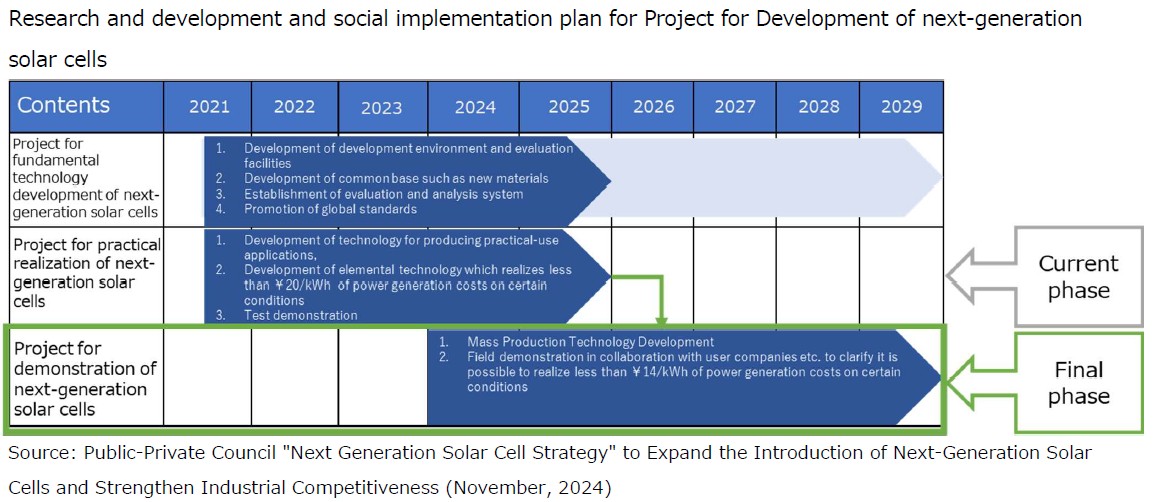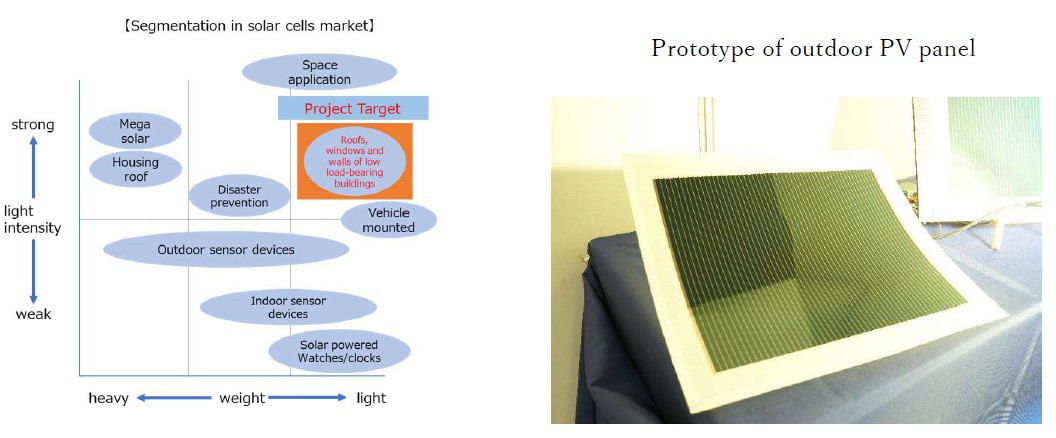
News&Topics(2025/9)News&Topics
-
- update:
- 2025.09.10
-
- category:
- News
Accelerating Mass Production Technology Development for Film-Type Perovskite Solar Cells, Paving the Way for Full-Scale Entry into Outdoor Installation Applications
EneCoat Technologies Co., Ltd. (Head office: Kumiyama-cho, Kuse-gun, Kyoto Prefecture; CEO: Naoya Kato; hereinafter referred to as “EneCoat”) is pleased to announce that a project “Mass production technology development and demonstration project for the social implementation of perovskite solar cells with high installation flexibility” (hereinafter referred to as “this project”) for the “Green Innovation Fund Project/Project for Demonstration of Next-generation Solar Cells” was adopted on 10 September 2025. This project was publicly solicited by the New Energy and Industrial Technology Development Organization (hereinafter referred to as “NEDO”).
This project is the final phase of the “Research and Development and Social Implementation Plan for Project for development of next-generation solar cells” formulated by the Agency for Natural Resources and Energy, Ministry of Economy, Trade and Industry (METI) , and aims to reduce power generation costs under certain conditions (solar radiation conditions, etc.) to 14 yen/kWh or less by fiscal year 2030. Following on from the current phase (Project for practical realization of next-generation solar cells, adopted on December 28, 2021), EneCoat will be working on research and development and social implementation of next-generation solar cells (perovskite solar cells) as one of the major players in Japan, with the support of the Green Innovation Fund.
 EneCoat also aims to leverage this project as an opportunity to fully enter the huge market for Selected for Final Phase of NEDO Green Innovation Fund Accelerating Mass Production Technology Development for Film-Type Perovskite Solar Cells, Paving the Way for Full-Scale Entry into Outdoor Installation Applications outdoor stationary applications with perovskite solar cells. Kyoto University, where EneCoat is originated, will participate as an outsourced entity in this project, and a powerful corporate-academia alliance (hereinafter referred to as the “Consortium”) will be formed with the following institutions.
EneCoat will be fully prepared to steadily translate the results of its research and development into social implementation toward achieving carbon neutrality by 2050, and then promote large-scale dissemination both domestically and internationally. Furthermore, the implementation of this project will see the full-scale introduction of the “roll-to-roll method” as a production method for the first time since the company’s establishment, and will strongly promote the creation of a market for the “filmtype” method, EneCoat’s specialty.
EneCoat also aims to leverage this project as an opportunity to fully enter the huge market for Selected for Final Phase of NEDO Green Innovation Fund Accelerating Mass Production Technology Development for Film-Type Perovskite Solar Cells, Paving the Way for Full-Scale Entry into Outdoor Installation Applications outdoor stationary applications with perovskite solar cells. Kyoto University, where EneCoat is originated, will participate as an outsourced entity in this project, and a powerful corporate-academia alliance (hereinafter referred to as the “Consortium”) will be formed with the following institutions.
EneCoat will be fully prepared to steadily translate the results of its research and development into social implementation toward achieving carbon neutrality by 2050, and then promote large-scale dissemination both domestically and internationally. Furthermore, the implementation of this project will see the full-scale introduction of the “roll-to-roll method” as a production method for the first time since the company’s establishment, and will strongly promote the creation of a market for the “filmtype” method, EneCoat’s specialty.
 The global race to develop perovskite solar panels has already entered the large-scale production phase, with Chinese companies taking on conventional crystalline silicon solar panels with their “glasstype” solar panels. Meanwhile, in Japan, there are hopes that a market will be formed soon by taking advantage of the light, thin, and flexible (bendable) characteristics of film-type perovskite solar panels, and introducing them into places where crystalline silicon solar panels cannot be installed (such as roofs and building walls with low load-bearing capacity), and this project will target this market.
The Japanese government’s “Seventh Strategic Energy Plan,” approved by the Cabinet in February 2025, and the “Next Generation Solar Cell Strategy,” revealed by METI at the end of November 2024, set out a clear numerical target of “aiming to introduce a cumulative total of approximately 20 GW of perovskite solar cells by 2040.” In response to this, competition to build large-scale production systems is expected to intensify in Japan as well, and EneCoat has formed the above consortium to enter this competition and will lead research and development as a core member of the consortium.
The global race to develop perovskite solar panels has already entered the large-scale production phase, with Chinese companies taking on conventional crystalline silicon solar panels with their “glasstype” solar panels. Meanwhile, in Japan, there are hopes that a market will be formed soon by taking advantage of the light, thin, and flexible (bendable) characteristics of film-type perovskite solar panels, and introducing them into places where crystalline silicon solar panels cannot be installed (such as roofs and building walls with low load-bearing capacity), and this project will target this market.
The Japanese government’s “Seventh Strategic Energy Plan,” approved by the Cabinet in February 2025, and the “Next Generation Solar Cell Strategy,” revealed by METI at the end of November 2024, set out a clear numerical target of “aiming to introduce a cumulative total of approximately 20 GW of perovskite solar cells by 2040.” In response to this, competition to build large-scale production systems is expected to intensify in Japan as well, and EneCoat has formed the above consortium to enter this competition and will lead research and development as a core member of the consortium.
 【Contact for inquiries regarding this matter】
E-mail:info@enecoat.com
【Contact for inquiries regarding this matter】
E-mail:info@enecoat.com
Pagetop
 EneCoat also aims to leverage this project as an opportunity to fully enter the huge market for Selected for Final Phase of NEDO Green Innovation Fund Accelerating Mass Production Technology Development for Film-Type Perovskite Solar Cells, Paving the Way for Full-Scale Entry into Outdoor Installation Applications outdoor stationary applications with perovskite solar cells. Kyoto University, where EneCoat is originated, will participate as an outsourced entity in this project, and a powerful corporate-academia alliance (hereinafter referred to as the “Consortium”) will be formed with the following institutions.
EneCoat will be fully prepared to steadily translate the results of its research and development into social implementation toward achieving carbon neutrality by 2050, and then promote large-scale dissemination both domestically and internationally. Furthermore, the implementation of this project will see the full-scale introduction of the “roll-to-roll method” as a production method for the first time since the company’s establishment, and will strongly promote the creation of a market for the “filmtype” method, EneCoat’s specialty.
EneCoat also aims to leverage this project as an opportunity to fully enter the huge market for Selected for Final Phase of NEDO Green Innovation Fund Accelerating Mass Production Technology Development for Film-Type Perovskite Solar Cells, Paving the Way for Full-Scale Entry into Outdoor Installation Applications outdoor stationary applications with perovskite solar cells. Kyoto University, where EneCoat is originated, will participate as an outsourced entity in this project, and a powerful corporate-academia alliance (hereinafter referred to as the “Consortium”) will be formed with the following institutions.
EneCoat will be fully prepared to steadily translate the results of its research and development into social implementation toward achieving carbon neutrality by 2050, and then promote large-scale dissemination both domestically and internationally. Furthermore, the implementation of this project will see the full-scale introduction of the “roll-to-roll method” as a production method for the first time since the company’s establishment, and will strongly promote the creation of a market for the “filmtype” method, EneCoat’s specialty.
 The global race to develop perovskite solar panels has already entered the large-scale production phase, with Chinese companies taking on conventional crystalline silicon solar panels with their “glasstype” solar panels. Meanwhile, in Japan, there are hopes that a market will be formed soon by taking advantage of the light, thin, and flexible (bendable) characteristics of film-type perovskite solar panels, and introducing them into places where crystalline silicon solar panels cannot be installed (such as roofs and building walls with low load-bearing capacity), and this project will target this market.
The Japanese government’s “Seventh Strategic Energy Plan,” approved by the Cabinet in February 2025, and the “Next Generation Solar Cell Strategy,” revealed by METI at the end of November 2024, set out a clear numerical target of “aiming to introduce a cumulative total of approximately 20 GW of perovskite solar cells by 2040.” In response to this, competition to build large-scale production systems is expected to intensify in Japan as well, and EneCoat has formed the above consortium to enter this competition and will lead research and development as a core member of the consortium.
The global race to develop perovskite solar panels has already entered the large-scale production phase, with Chinese companies taking on conventional crystalline silicon solar panels with their “glasstype” solar panels. Meanwhile, in Japan, there are hopes that a market will be formed soon by taking advantage of the light, thin, and flexible (bendable) characteristics of film-type perovskite solar panels, and introducing them into places where crystalline silicon solar panels cannot be installed (such as roofs and building walls with low load-bearing capacity), and this project will target this market.
The Japanese government’s “Seventh Strategic Energy Plan,” approved by the Cabinet in February 2025, and the “Next Generation Solar Cell Strategy,” revealed by METI at the end of November 2024, set out a clear numerical target of “aiming to introduce a cumulative total of approximately 20 GW of perovskite solar cells by 2040.” In response to this, competition to build large-scale production systems is expected to intensify in Japan as well, and EneCoat has formed the above consortium to enter this competition and will lead research and development as a core member of the consortium.
 【Contact for inquiries regarding this matter】
E-mail:info@enecoat.com
【Contact for inquiries regarding this matter】
E-mail:info@enecoat.com
